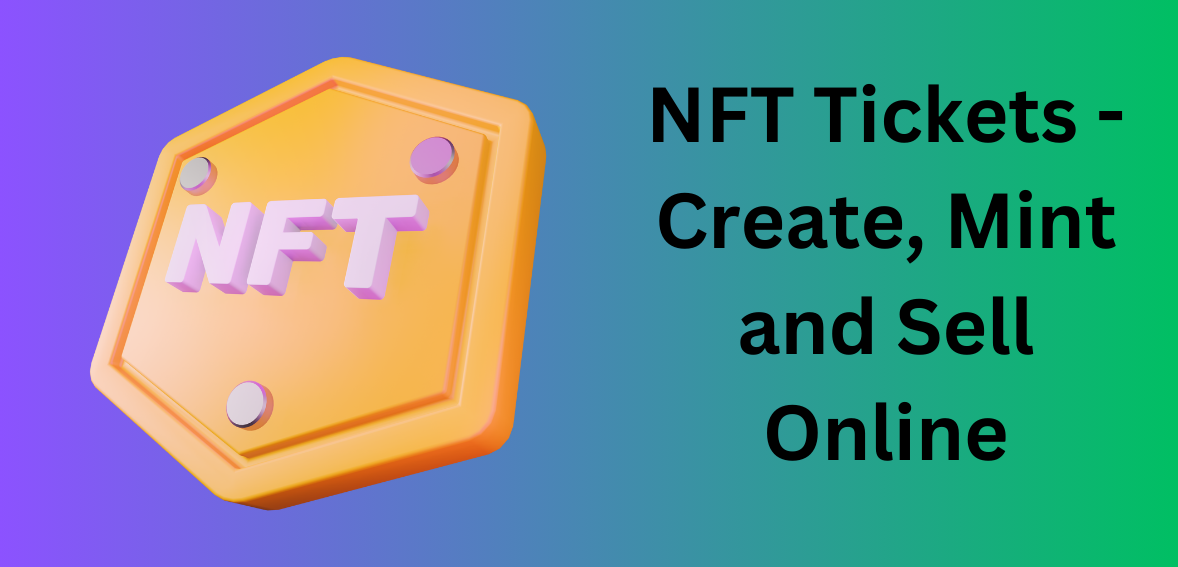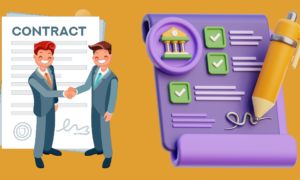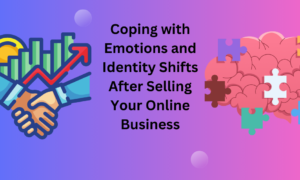Step into the future of ticketing with NFTs! Imagine a world where paper tickets are a thing of the past, and digital assets hold the key to unforgettable experiences. That’s exactly what NFT Tickets offer – a revolutionary way to create, mint, and sell tickets online. Whether you’re an event organizer looking for a cutting-edge solution or an avid fan eager to own exclusive memorabilia, this blog post will take you on an exciting journey through the world of NFT Tickets. Buckle up and get ready to discover how these digital marvels are transforming the entertainment industry as we know it!
What are NFT Tickets?
NFT stands for Non-Fungible Token, and it has taken the digital world by storm. Essentially, an NFT is a unique digital asset that represents ownership or proof of authenticity of a specific item or piece of content. In the case of NFT Tickets, these tokens represent admission to events such as concerts, sporting events, conferences, and more.
Unlike traditional tickets that can be easily replicated or counterfeited, NFT Tickets offer unparalleled security and immutability through blockchain technology. Each ticket is assigned a distinct identifier that cannot be duplicated or tampered with.
But what makes NFT Tickets truly special is their ability to unlock exclusive perks and experiences for holders. Imagine owning a VIP ticket to your favorite artist’s concert that grants you backstage access or being able to resell your ticket at a premium price due to its scarcity value – all made possible by the unique features embedded within each token.
In addition to their undeniable uniqueness and added benefits, NFT Tickets also provide an avenue for artists, performers, and event organizers to directly engage with fans in new and exciting ways. With every ticket purchase comes the potential for additional rewards like limited edition merchandise or meet-and-greet opportunities.
NFT Tickets are revolutionizing how we think about ticketing in the entertainment industry. They bring together security measures with enhanced fan experiences while empowering creators with innovative monetization opportunities. The rise of this digital phenomenon marks an exciting era where tangible memories merge seamlessly with cutting-edge technology – creating unforgettable moments for both artists and enthusiasts alike.
The Rise of NFTs in the Entertainment Industry
The entertainment industry is no stranger to innovation and disruption. From the rise of streaming platforms to virtual reality experiences, technology has transformed the way we consume content. And now, a new player has entered the scene – NFTs.
NFTs, or non-fungible tokens, have taken the world by storm with their ability to tokenize digital assets and provide proof of ownership on the blockchain. While initially associated with art and collectibles, NFTs are quickly making their mark in the entertainment industry.
Musicians are using NFTs to release exclusive tracks and live performances, allowing fans to own a piece of music history. Filmmakers are exploring NFT ticketing for virtual movie premieres, giving viewers an immersive experience from the comfort of their homes. Even sports teams are jumping on board, offering limited edition NFT tickets that come with special perks like access to VIP events or meet-and-greets with players.
One of the main benefits of using NFT tickets in the entertainment industry is increased revenue potential. By turning tickets into unique digital assets that can be bought and sold on secondary markets, artists and event organizers stand to profit from increased demand and scarcity.
Additionally, NFT tickets offer enhanced security measures compared to traditional paper or e-tickets. The blockchain provides an immutable record of ownership that eliminates fraud and counterfeit tickets. This not only protects consumers but also ensures artists receive fair compensation for their work.
Creating and minting NFT tickets is easier than you might think. There are several platforms available that allow creators to upload their content, whether it’s a concert ticket design or a virtual reality experience. Once uploaded, these platforms guide users through the process of minting an NFT by attaching unique metadata such as ticket details or artwork.
When it comes time to sell your NFT tickets, there’s no shortage of marketplaces where collectors can browse and purchase them. Platforms like OpenSea and Rarible offer a wide range of NFTs, including tickets for concerts, festivals
Benefits of Using NFT Tickets
NFT tickets, also known as non-fungible token tickets, have gained immense popularity in the entertainment industry for several reasons. Let’s explore some of the key benefits associated with using NFT tickets.
NFT tickets provide a unique and secure way to authenticate ownership and access to events. Each ticket is minted on the blockchain, making it virtually impossible to duplicate or counterfeit. This eliminates the risk of fraudulent ticket sales and ensures that only genuine holders can attend an event.
Additionally, NFT tickets offer increased flexibility for both buyers and sellers. Unlike traditional paper or digital tickets that are often tied to specific dates or venues, NFT tickets can be easily transferred or resold on various platforms. This allows ticket owners to effortlessly sell their unused tickets without any hassle.
Furthermore, utilizing NFTs for ticketing purposes opens up exciting possibilities for fan engagement and rewards. Artists and event organizers can create limited edition collectible tickets that come with exclusive perks such as backstage access, meet-and-greets with performers, or even special merchandise items. This not only enhances the overall experience for fans but also creates additional revenue streams for artists.
Moreover, by leveraging blockchain technology, NFT ticketing systems enable transparent tracking of transactions throughout their lifecycle. This means that all parties involved – from event organizers to secondary market sellers – can benefit from a clear record of every transaction made with a particular ticket. This transparency helps maintain trust within the ecosystem while reducing instances of scalping and price manipulation.
In conclusion, the use of NFT tickets brings numerous advantages to the entertainment industry including enhanced security measures against fraudsters; improved flexibility in terms of transferability; increased opportunities for fan engagement; and greater transparency in transaction tracking.
How to Create and Mint NFT Tickets
Creating and minting NFT tickets is an exciting process that allows artists, event organizers, and fans to participate in the growing world of blockchain technology. If you’re eager to get started on creating your own NFT tickets, here’s a step-by-step guide.
Decide on the platform you want to use for minting your NFTs. There are several options available such as OpenSea, Rarible, and Mintable. Each platform has its own unique features and benefits, so take some time to research which one suits your needs best.
Next, gather all the necessary information about your event or artwork. This may include details like date, venue, ticket pricing tiers, and any additional perks or bonuses attached to certain ticket types.
Once you have all the relevant information ready, it’s time to create the digital assets for your NFT tickets. Consider working with a graphic designer or artist who can help translate your vision into captivating visual elements that will make your tickets stand out.
After finalizing the design of your NFT ticket assets comes the crucial step of minting them onto the blockchain. This involves uploading your digital assets onto a marketplace or platform that supports NFT creation and verification processes.
During this process, you’ll typically need to provide details such as title, description, royalty percentage,
and supply quantity. Once these details are submitted, the platform will generate a unique token representing each individual ticket. This token will be stored on the blockchain alongside its metadata including ownership history, creation date, and other essential information.
Remember that during this entire process it’s important to remain mindful of gas fees – transaction costs associated with using certain blockchains – as they can vary significantly depending on network congestion.
Creating and minting NFT tickets opens up new opportunities for artists and event organizers by providing an innovative way for fans to connect with their favorite experiences while also offering potential revenue streams through secondary sales and royalties. So don’t hesitate to dive into the world of NFT
Platforms for Selling NFT Tickets
When it comes to selling NFT tickets, there are several platforms available that cater specifically to this growing market. These platforms provide a seamless and secure way for creators to list and sell their unique digital tickets.
One popular platform is OpenSea, which is known for its wide range of digital assets, including NFTs. Creators can easily create and list their NFT tickets on OpenSea, reaching a large audience of potential buyers.
Another platform gaining traction in the NFT ticket space is Rarible. This decentralized marketplace allows creators to mint and sell their own NFTs without the need for intermediaries. With Rarible’s easy-to-use interface, creators can showcase their unique tickets and engage with interested buyers directly.
For those looking for a more specialized platform, SuperRare might be the perfect fit. SuperRare focuses on high-quality digital art and collectibles but has also expanded into the world of NFT tickets. Creators who prioritize exclusivity and scarcity will find this platform appealing.
Additionally, Mintable provides an intuitive interface that simplifies the process of creating and listing NFT tickets. With features like customizable smart contracts and royalty settings, Mintable empowers creators to have full control over their ticket sales.
It’s important for creators to research these platforms thoroughly before deciding where to list their NFT tickets. Each platform offers different features, fees structures, and user bases – finding the right fit can significantly impact success in selling these unique digital assets.
Potential Challenges and Solutions
As with any emerging technology, NFT tickets also come with their fair share of challenges. One major concern is the issue of counterfeiting or fraudulent tickets. Since NFTs are digital assets, there is always a risk of someone creating fake tickets and selling them to unsuspecting buyers. To combat this problem, it is crucial for event organizers to implement robust security measures when minting and distributing NFT tickets. This may include using encryption techniques or partnering with trustworthy platforms that have stringent verification processes.
Another challenge is the potential for high transaction fees on blockchain networks. Blockchain transactions can sometimes be costly due to network congestion and fluctuating gas prices. This can pose a barrier to entry for some ticket buyers who may not want to pay excessive fees just to purchase an NFT ticket. To address this issue, developers and platforms can explore layer 2 solutions or alternate blockchain networks that offer lower fees and faster transaction times.
Furthermore, the concept of owning a digital ticket might seem alien to some people who still prefer physical copies as keepsakes from events they attend. Educating consumers about the benefits and uniqueness of owning an NFT ticket could help overcome this reluctance.
Additionally, scalability is another challenge that needs consideration in order for NFT tickets to become widely adopted in large-scale events with thousands of attendees simultaneously trying to access their digital tickets at once.
To tackle these challenges head-on, collaboration between event organizers, blockchain developers, and platform providers is paramount. By working together, they can develop user-friendly interfaces, improve security protocols, reduce transaction costs through optimization strategies like batch processing,
and create seamless experiences for both buyers and sellers.
In conclusion (not conclusive), while there are obstacles that need addressing before widespread adoption of NFT tickets becomes a reality in the entertainment industry (never summarize), there are viable solutions available if stakeholders come together (never conclude). With continued innovation (avoid repetitive words)and community support, NFT tickets have the potential to revolutionize ticketing and provide unique
The Future of NFT Tickets
As the world becomes increasingly digital, it’s no surprise that NFTs have made their way into the entertainment industry. NFT tickets are poised to revolutionize the way we experience live events and could very well be the future of ticketing.
One exciting aspect of NFT tickets is their potential for enhancing engagement with fans. Imagine attending a concert where your ticket not only grants you entry but also gives you access to exclusive content, behind-the-scenes footage, or even a meet-and-greet with the artist. This added value creates a more immersive and personalized experience for attendees.
Furthermore, NFT tickets have the potential to combat issues like scalping and counterfeit tickets. The unique nature of each token ensures that they cannot be duplicated or resold without authorization from the original creator. This provides peace of mind for both event organizers and attendees alike.
In addition to these benefits, NFT tickets also offer new revenue streams for artists and creators. By minting limited edition collectible tickets or offering special perks exclusively through NFTs, artists can generate additional income while building stronger connections with their fanbase.
However, there are still challenges that need to be addressed before widespread adoption can occur. One such challenge is ensuring accessibility for all fans, especially those who may not be familiar with blockchain technology or have limited resources to invest in digital assets.
To overcome this hurdle, education and user-friendly platforms will play a crucial role in making NFT tickets accessible to everyone. Simplified processes for creating and purchasing tokens will help broaden participation and ensure inclusivity within this emerging market.
Looking ahead, we can expect continued innovation in how NFTs are used within ticketing systems. From interactive experiences during virtual concerts to gamification elements incorporated into event attendance – possibilities abound when it comes to integrating blockchain technology into our live entertainment experiences.
In conclusion (not conclusive), while still relatively new on the scene, it’s clear that NFT tickets have the potential to transform the entertainment industry. By offering
Conclusion
In this digital age, the rise of NFTs has revolutionized various industries, and the entertainment sector is no exception. NFT tickets have emerged as a unique and innovative way to experience events, concerts, festivals, and more. With their numerous benefits such as proof of ownership, enhanced security measures, and potential for increased revenue streams for creators and artists, it’s clear that NFT tickets are here to stay.
Creating and minting NFT tickets can be done through specialized platforms that offer user-friendly interfaces. By following simple steps like designing the ticket artwork or incorporating interactive elements into the digital collectible, event organizers can unlock a whole new world of possibilities.
When it comes to selling these one-of-a-kind assets, there are several platforms available in the market catering specifically to NFT transactions. These platforms provide creators with access to a global audience eager to purchase unique experiences digitally.
While embracing NFT tickets offers exciting opportunities for both event organizers and attendees alike, there are also challenges that need addressing. Issues regarding scalability on blockchain networks can cause delays or high transaction fees. However, ongoing technological advancements aim to alleviate these concerns by improving efficiency and reducing costs.
Looking ahead into the future of NFT tickets holds immense promise. As blockchain technology continues evolving at an unprecedented pace, we can expect even greater integration between physical live events and digital experiences. The possibilities seem endless – from virtual reality concerts where attendees interact with holographic performers using their personalized NFT ticket credentials all the way down to small local gatherings leveraging this technology for added exclusivity.
In conclusion (without saying ‘in conclusion’), embracing NFT tickets opens up doors not only for event organizers but also for artists looking for new ways to monetize their talent while providing fans with unforgettable experiences they can cherish forever. So whether you’re an avid concert-goer or an aspiring creator seeking innovative avenues – get ready because the era of NFT tickets is upon us, and it’s time to join the revolution!



























